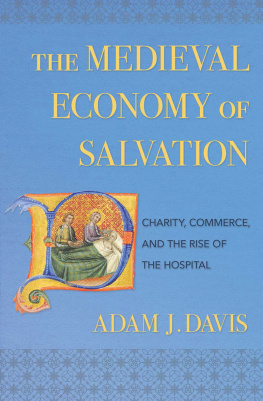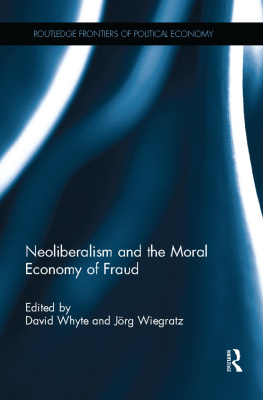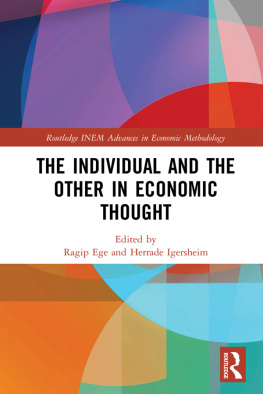THE IDEA OF A MORAL ECONOMY
Gerard of Siena on Usury, Restitution, and
Prescription

Giotto di Bondone, The Last Judgment (detail), Arena Chapel, Padua
The Idea of a Moral Economy
Gerard of Siena on Usury, Restitution, and Prescription
LAWRIN ARMSTRONG

University of Toronto Press 2016
Toronto Buffalo London
www.utppublishing.com
Printed in the U.S.A.
ISBN 978-1-4426-4322-2
 Printed on acid-free, 100% post-consumer recycled paper with vegetable-based inks.
Printed on acid-free, 100% post-consumer recycled paper with vegetable-based inks.

Library and Archives Canada Cataloguing in Publication
Gerardus, de Senis, 1336?, author
The idea of a moral economy : Gerard of Siena on usury, restitution, and prescription / [edited and translated by] Lawrin Armstrong.
(Toronto studies in medieval law)
Includes the Latin text and English translations of: Quaestio de usura; Tractatus de restitution; and Quaestio de praescriptione.
Includes bibliographical references and index.
Includes text in English and Latin.
ISBN 978-1-4426-4322-2 (bound)
1. Gerardus, de Senis, 1336? Quaestio de usura. 2. Gerardus, de Senis, 1336? Tractatus de restitution. 3. Gerardus, de Senis, 1336? Quaestio de praescriptione. 4. Usury Early works to 1800. 5. Restitution Early works to 1800. 6. Prescription (Law) Early works to 1800. 7. Economics Moral and ethical aspects Early works to 1800. 8. Natural law Early works to 1800. 9. Law, Medieval. 10. Philosophy, Medieval. 11. Theology History Middle Ages, 6001500. I. Armstrong, Lawrin D. (Lawrin David), editor, translator II. Gerardus, de Senis, 1336? Works. Selections. III. Gerardus, de Senis, 1336? Works. Selections. English. IV. Title. V. Series: Toronto studies in medieval law
HB79.G47 2016 330.10902 C2015-907224-7

This book has been published with the help of a grant from the Federation for the Humanities and Social Sciences, through the Awards to Scholarly Publications Program, using funds provided by the Social Sciences and Humanities Research Council of Canada.
University of Toronto Press gratefully acknowledges the financial assistance of the Centre for Medieval Studies, University of Toronto in the publication of this book.
University of Toronto Press acknowledges the financial assistance to its publishing program of the Canada Council for the Arts and the Ontario Arts Council, an agency of the Government of Ontario.

Zum Andenken an
E RWIN W ILL
19241999
und
M ARIANNE W ILL ( GEB . R ITTER )
19332014
Saepe etiam cupidis argentum inmane coruscat
Accenditque animos auri fallentis amore
Delusos fugiens uano phantasmate tactus.
To the avaricious, he often appears as a glittering heap of silver
and inflames their minds with lust for false gold,
but touched, he flees such fools like an empty fantasy.
Avitus, De spiritalis historiae gestis 2. 668.
E perch lusuriere altra via tene,
per s natura e per la sua seguace
dispregia, poi chin altro pon la spene.
But the usurer contrives a third way yet,
And in herself and her follower, Art,
Scorns Nature, for his hope is elsewhere set.
Dante, Inferno 11.10911 (trans. D.L. Sayers)
Mit der Entwicklung des zinstragenden Kapitals und des Kreditsystems scheint sich alles Kapital zu verdoppeln und stellenweis zu verdreifachen durch die verschiedne Weise, worin dasselbe Kapital oder auch nur dieselbe Schuldforderung in verschiednen Hnden unter verschiednen Formen erscheint. Der grte Teil dieses Geldkapitals ist rein fiktiv In diesen Tatsachen, da sogar eine Akkumulation von Schulden als Akkumulation von Kapital erscheinen kann, zeigt sich die Vollendung der Verdrehung, die im Kreditsystem stattfindet.
With the development of interest-bearing capital and the credit system, all capital seems to be duplicated, and at some points triplicated by the various ways in which the same capital, or even the same claim, appears in various hands in different guises. The greater part of this money capital is purely fictitious In the way that even an accumulation of debts can appear as an accumulation of capital, we see the distortion involved in the credit system reach its culmination.
Marx, Das Kapital, Volume 3, 2930 (trans. D. Fernbach)
Contents
Preface and Acknowledgments
Few would deny that the crisis precipitated by the collapse of Lehman Brothers in 2008, which, as I write, shows every sign of entering a fresh circuit of instability, is a crisis of what Marx called fictitious capital, or credit. Confronted by stagnating markets, themselves the product of the defeat of organized labour and static or declining real wages since the late 1970s, capital has increasingly bypassed production in favour of financial speculation above all, speculation in asset values to maintain profits. The result has been a massive expansion of debt a recent calculation puts total private and public debt at 212 per cent of global GDP, an increase of 38 per cent since 2008 a series of destructive devaluations, and the dramatic enrichment of a tiny global oligarchy. The social and political consequences are clear: mass unemployment, political instability, and skewed wealth distributions, not just between the developed and developing worlds, but within the advanced economies themselves, which have witnessed levels of material inequality unknown since the Great Depression.
The crisis has inspired several Marxist and neo-Keynsian critiques of the neoliberal program responsible for the dbcle of 2008. These have been matched by renewed attention to pre-capitalist traditions of moral economy among historians, anthropologists, sociologists, and non-orthodox economists seeking to imagine an economic order dedicated to the common good rather than to private profit and limitless growth. This book, though begun before the crisis, is conceived as a modest contribution to the latter literature. It offers an edition and translation of three questions disputed in Paris in 1330 by the Augustinian friar and master of theology Gerard of Siena on the topics of usury, the restitution of usurious profits, and prescription (a mode of acquiring ownership of real property). Together they offer a particularly lucid example of scholastic ideas about the nature and purpose of economic activity and as such, I hope, can help us to situate our present predicament in a longer historical and moral perspective than the one offered by contemporary economics. Although Gerard was a theologian, he framed his questions largely in legal terms or in response to commonly held legal opinions. Moreover, his views on usury and prescription were taken up and popularized by the most famous canonist of his day, Giovanni dAndrea, so it seems appropriate that this edition appears as the third volume of the Toronto Studies in Medieval Law series.
Next page







 Printed on acid-free, 100% post-consumer recycled paper with vegetable-based inks.
Printed on acid-free, 100% post-consumer recycled paper with vegetable-based inks.
